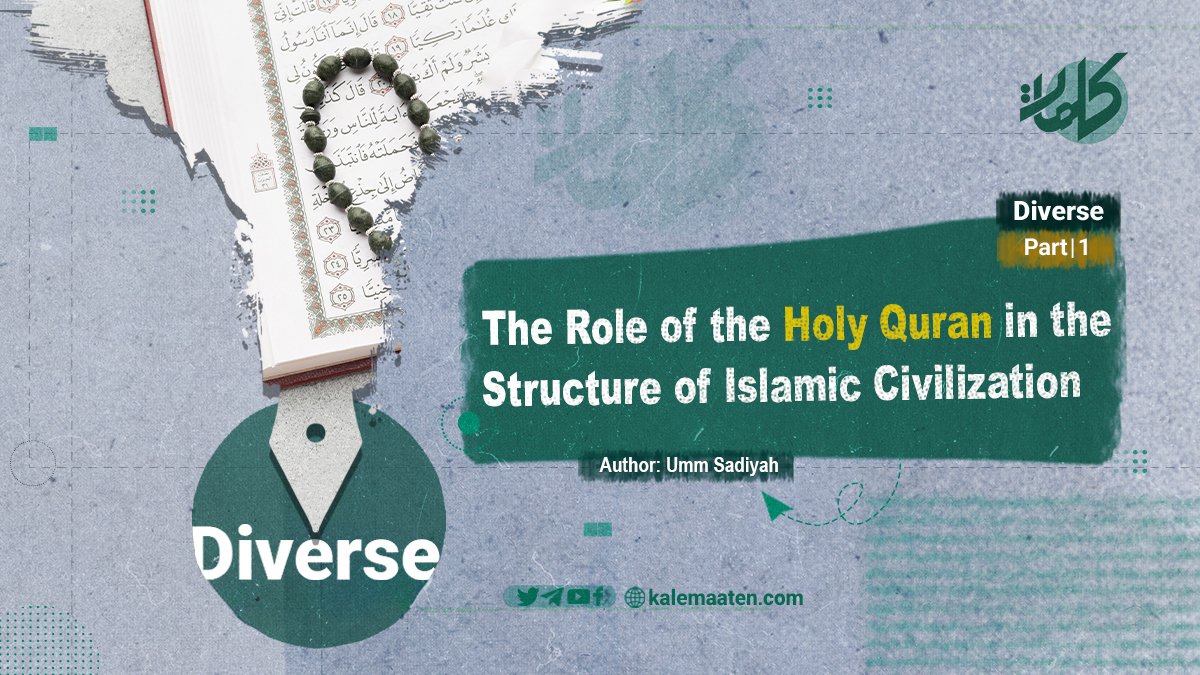Author: Umm Sadiyah
The Role of the Holy Quran in the Structure of Islamic Civilization (Part One)
Abstract
Civilizations possess unique features and characteristics that distinguish them from other eras and civilizations. After the advent of the Prophet of Islam and the revelation of the Quran, humanity, during the golden age of Islam, experienced the most advanced and elevated civilization under the guidance of Qur’anic verses and divine commandments.
Accordingly, it is essential to examine religious sources—especially the Holy Quran—as a repository of divine knowledge that encompasses religious, intellectual, ethical, and scientific teachings across various domains of human life, in order to rediscover and determine its position and role in the process of civilization-building.
This study, using descriptive and analytical methods, aims to answer the question: What role and position does the Qur’an, as the richest source of cultural and civilizational production, hold in the structure of modern Islamic civilization?
The findings indicate that the teachings of the Holy Qur’an, in both the material (politics, governance, economy, social relations, science and knowledge) and spiritual (ethics, monotheism, unity, enjoining good and forbidding evil) dimensions of civilization, have led to the flourishing of human civilization—especially the Islamic civilization—creating a distinct and unique civilizational model.
Introduction
Civilizations can be divided into two domains: pre-historical and post-historical. Each era and civilization possess distinct features and characteristics that differentiate it from others. The epistemic and ideological distinction between post-history and pre-history is clear and undeniable. Humanity’s way of life and relationship with existence and its Creator deeply influence foundational civilizational pillars such as economy, politics, religion, moral values, and customs.
For instance, Babylon is distinct from ancient Egypt, just as the Greeks differ from their contemporaries, and the Islamic civilization bears many differences from others. The lifestyle of human beings, as the primary agents and makers of history, reflects this distinction. Wherever there is civilization, scientific production, innovation, insightful vision, sound thinking, and noble ideas are present at its peak.
On this basis, it becomes essential to examine religious sources—especially the Holy Qur’an—as a profound source of divine knowledge encompassing intellectual, conceptual, and scientific teachings across various dimensions of human life, to identify and define its place in the process and outcome of civilization-building.
Muslims began their pursuit of knowledge by delving into the meanings and concepts of the Qur’anic verses, followed by the Hadith. It was the Qur’an that wove the fabric of civilization, caused it to flourish, and made it the greatest civilization from the time of Adam to the Seal of the Prophets.
In truth, the central question here is: “What role and status do the Qur’an, as the most enriched source of cultural and civilizational production, hold in the structure of modern Islamic civilization?”
1. Conceptual Clarification
In Arabic, the term synonymous with “civilization” is ḥaḍārah (حضارة), and the word “tamaddun” (تمدن) is derived from the root “madana”, meaning “city”. From this root also come words like madīnah (city) and madan.
In Persian, the term madaniyyat (مدنیت) is used alongside tamaddun, meaning “urban life” or “living in a city.”
In Latin, the root of the term “civilization” can be traced to civitas and civis, which both mean “city”. Civilization refers to a settled and organized life within a large urban unit, as opposed to nomadic, tent-dwelling, or rural life.
John Lewis writes: “Civilization is a stage of culture in which the arts and political life have attained the necessary advancement. Signs of this advancement include the existence of social classes, specialization, the emergence of cities, accounting, and writing.”
Will Durant defines civilization as: “Civilization is a cultural creativity made possible by the existence of social order, rule of law, and relative prosperity.”
2. Terminological Definition of Civilization
Civilization can be defined as a comprehensive whole—a collection of political, economic, social, cultural structures and religious and moral values, wherein human beings act as the primary agents. Like any living organism, civilization passes through stages of emergence, flourishing, and ultimately decline.
Furthermore, civilization is a manifestation of individuals’ mental constructs, reflected in reality according to the level of their needs.
3. The Role of the Holy Qur’an in the Structure of Islamic Civilization
Civilization consists of two dimensions: material and spiritual.
1. Material Dimension: This is the more obvious dimension, addressing the physical and biological needs of human beings.
2. Spiritual Dimension: This encompasses concepts such as religiosity, awareness and thought, mythology, and even magic. It responds to the spiritual and psychological needs of individuals.
Throughout history, no civilization has existed devoid of both these dimensions. This duality plays a fundamental role in the formation and evolution of civilizations.
The development and flourishing of a civilization depend on attention to both dimensions. A civilization that focuses on only one aspect will be incomplete and unstable.
In the following sections, the role of the Qur’an’s teachings in the structure of Islamic civilization will be briefly examined in both its material and spiritual dimensions.
Continues…
Next Part
References
[1]. Raghib Isfahani, Mufradat fi Gharib al-Quran, p. 468; Maqa’is al-Lagha, p. 820.
[2]. Azarang, Abdul Hussein; History of Civilization, p. 15.
[3]. Halabi, Ali Asghar; History of Islamic Civilization, p. 17.
[4]. Ibid., p. 18, quoted from Will Durant’s History.



